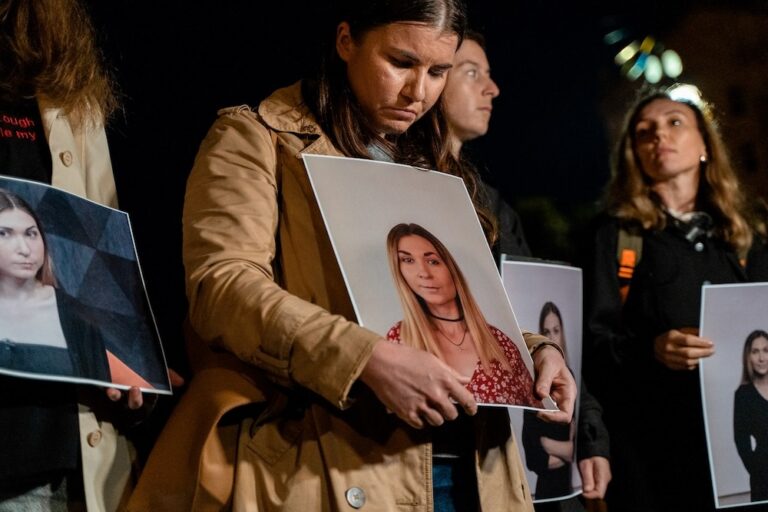By defending Crimea's minority Tatars against Russian persecution, Emil Kurbedinov has himself become a target in a region renowned for imprisonments and disappearances.
They want people to do what they are told… Russia is tightening its grip: they arrested 11 people in one day and locked them up for five days on made-up charges.
Emil Kurbedinov is a Crimean Tatar. He is also a leading human rights lawyer who defends those – both Tatar and non-Tatar – who raise their voices against Russia’s occupation of the Crimean peninsula. It’s a heavy workload and one with special resonance for Kurbedinov, whose people have suffered periods of violent repression throughout their history, often at the hands of Russia.
The Crimean Tatars have lived in the much-fought-over Crimean peninsula for over 1,000 years and currently make up approximately 13% of the area’s population. Speaking a Turkic language and traditionally adherents to the Sunni branch of Islam, the Crimean Tatars have sometimes been portrayed as an ‘enemy of the state’ by Russian authoritarians seeking to repress them. The most appalling example of this occurred during the Second World War when Josef Stalin accused the Tatars of siding with the Nazis and ordered the deportation of 180,000 Crimean Tatars to Central Asia (many ended up in labour camps). After Stalin’s death, the Soviet Union decided to drop the Nazi-collaboration charges but, by then, Stalin’s Tatar policy had already resulted in around 100,000 deaths.
Today, although the terminology in use is different – and the scale of the action much smaller – Russia is again persecuting the Crimean Tatars.
Since its illegal annexation of the peninsula in February 2014, Russia has been cracking down on Crimean protests against the occupation. Many of the most prominent protesters have been Tatars, who have suffered greatly for their activism. According to recent reports, 43 activists have been kidnapped – apparently by the Russian authorities – over the last two years. Most of these abductees have been Tatar. Eighteen are still missing and six of them have been found dead. There have been numerous arrests of Tatars on allegations of belonging to the Islamist group Hizb ut Tahrir which – crucially – is a completely lawful organisation in Ukraine (although it’s illegal in Russia). The Russian authorities have also been cracking down on Crimean Tatar culture: in April 2016, the Crimean Mejlis (a Tatar elected representative body) was declared an “extremist organisation” and banned. Tatar and other media have been hounded too: some press outlets have been shut down and the homes of journalists have been raided. Since the Russian invasion, an estimated 20,000 Tatars have chosen to leave Crimea.
Few human rights lawyers choose to work in this kind of environment, but Emil Kurbedinov is an exception. His client list reads like a who’s who of Crimean resistance and includes the Tatar leader Ilmi Umerov, who was charged with “public calls to action aimed at violating Russia’s territorial integrity” following his public statement that Crimea was Ukrainian and that Russia should be made to leave. Also among Kurbedinov’s clients is Suleiman Kadyrov, a retired policeman and Crimean Tatar (born in exile) who returned to the peninsula in 1991; he was charged with the same offence as Umerov after expressing similar views. Both of these men face five years in jail if convicted, even though they have only expressed the view of the United Nations.
As well as defending his clients, Kurbedinov publicly criticises Russia’s rights violations in Crimea. Unsurprisingly, his work has made him a target for the Russian authorities.
On 26 January 2017, Kurbedinov and a fellow lawyer were informed that Russian security agents had begun searching the home of a client, the Tatar activist Seyran Saliev. Whilst driving to their client’s house, the lawyers were flagged down and interrogated by a group of masked, armed men who identified themselves as members of the Russian Federal Security Service (FSB). Later, the men took Kurbedinov to the Zheleznodorozhny district court of Simferopol where he was tried, found guilty of “propagandising for extremist organisations” and sentenced to ten days’ detention; Kurbedinov’s house was also searched and laptops and other electronic equipment seized. The clearly trumped-up charge against Kurbedinov was based on a 2013 social media post – a video that the lawyer had uploaded onto his personal page of a Hizb ut Tahrir demonstration that he had witnessed.
International human rights organisations and local activists campaigned for Kurbedinov’s release, arguing that he was being punished solely for his human rights work. On his release, Kurbedinov thanked those who campaigned for him, saying that it “showed me that civil society is alive; that people are not indifferent to violations of human rights.”
But the harassment continued. In March 2017, Kurbedinov was told by the Russian Investigative Committee in Crimea that he would be questioned during a preliminary criminal investigation for supposedly divulging information from a pre-trial hearing. Kurbedinov maintained that this was merely another attempt to punish him for his work and linked it specifically to his attendance at a European Parliament event earlier in the month, at which he had condemned the human rights abuses currently taking place in occupied Crimea.
In December 2018, Kurbedinov was the target of judicial harassment once again when he was sentenced to five days of administrative detention, again for an old Facebook post which the court decided was “propagandising for extremist organisations”. Following this, in January 2019, the Crimean Directorate of the Ministry of Justice of the Russian Federation wrote to Kurbedinov to tell him that he would be disbarred from the Crimean Bar Association before 1 March 2019; in February, however, the Crimean Bar Association decided to maintain his membership.
In May 2017, Emil Kurbedinov was awarded the Front Line Defenders Award for Human Rights Defenders at Risk.



